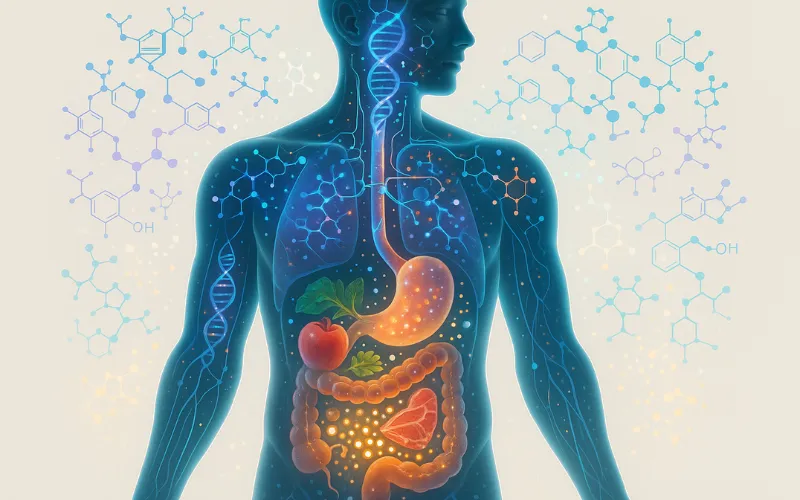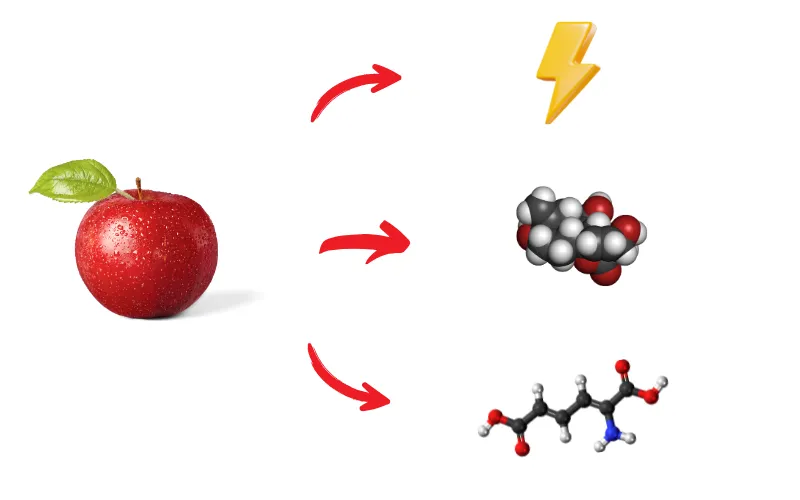
Picture this: you eat an apple, and within hours, your body transforms that simple fruit into thousands of different molecules, each one playing a specific role in keeping you healthy. What if you could see this molecular mechanism in action? That’s exactly what metabolomics does—it gives us a front-row seat to watch how your body processes every nutrient you consume.
Discover how this molecular detective work is changing everything we thought we knew about personalized nutrition—and why your metabolic fingerprint might be the key to revealing your optimal health.
Key Takeaways
-
Metabolomics reveals your unique nutritional blueprint by analyzing thousands of metabolites (chemical byproducts) that show exactly how your body processes nutrients at the cellular level, moving beyond generic dietary advice to personalized nutrition based on your biochemistry.
-
Traditional nutrition testing misses critical information that metabolomics can detect, such as nutrient processing inefficiencies, hidden deficiencies, and metabolic dysfunction years before they appear in standard blood work or cause noticeable symptoms.
-
Your gut microbiome plays a crucial role in nutrient metabolism by producing metabolites that influence everything from inflammation to mood, making the gut-nutrient connection essential for understanding why identical diets produce different health outcomes in other people.
-
Personalized nutrition plans based on metabolomic data have shown superior results compared to standard dietary approaches, with studies demonstrating significant improvements in weight loss, diabetes management, and chronic condition outcomes when nutrition is tailored to individual metabolic patterns.
-
Implementation requires finding qualified practitioners trained in functional medicine and metabolomics, with testing involving simple blood, urine, or stool samples that are analyzed using advanced technologies like mass spectrometry to create actionable, personalized health recommendations.
-
Metabolomics addresses root causes of chronic conditions, including obesity, diabetes, inflammatory bowel diseases, and neurodegenerative conditions, by identifying disrupted metabolic pathways and allowing for targeted interventions before symptoms become severe.
Table of Contents
Unlocking the Power of Metabolomics and Nutrient Metabolism for Optimal Health
Your body functions like a complex chemistry lab, constantly performing countless molecular interactions. Metabolomics helps uncover this unique molecular activity, showing how your body processes nutrients. Everyone’s metabolic response is different—what works for one person might not work for another—because nutrient metabolism operates uniquely at the cellular level.
Decoding Your Body’s Chemical Conversations
When you bite into an apple, your body doesn’t just register “fruit.“ It’s processing hundreds of compounds—from natural sugars to antioxidants like quercetin—and each person’s metabolic response tells a different story.
Researchers can now measure these metabolic conversations through simple blood or urine tests. They’re looking at metabolites—the chemical footprints left behind when your body breaks down nutrients.
The MTHFR Connection: A Real-World Example
About 40% of people have MTHFR gene variations, reducing their ability to process folate, a vital B vitamin, to 60% efficiency. While traditional advice recommends eating more leafy greens, metabolomics suggests using methylated folate to bypass this genetic issue.
Beyond One-Size-Fits-All Nutrition
The traditional nutrition pyramid assumes everyone has the same metabolism, but that’s not true. Some people burn carbs quickly and need more protein and fats, while others process carbs slowly and thrive on complex carbohydrates and lighter proteins. Your metabolic type affects your energy and mood.
The Practical Side of Metabolomic Testing
Modern testing platforms can analyze your unique biochemical profile, offering personalized insights to understand how your body metabolizes nutrients. Through simple blood or urine tests, you’ll get a detailed report identifying nutrient deficiencies and areas for improvement, helping you make informed health decisions.
Metabolomics and Functional Medicine
Metabolomics helps identify your body’s unique needs, such as specific amino acids to stabilize blood sugar or issues processing omega-6 fatty acids that cause inflammation. This approach, combined with functional medicine, focuses on precise, personalized nutrition to address root biochemical imbalances for better, long-lasting health results, without relying on costly supplements or complex diets.

What Is Metabolomics and Why Does It Matter in Functional Medicine?
Metabolomics is like a diary for your body, recording how nutrients are transformed into energy, hormones, and cellular components. Unlike traditional nutrition, which focuses on what you eat, metabolomics shows how your body uses those nutrients, incorporating principles of mitochondrial nutrigenomics to uncover how diet influences mitochondrial gene expression and energy production at the cellular level.
Your digestive system functions like a master chef, creating thousands of “recipes” from molecules like amino acids, lipids, and carbohydrates. These recipes reveal how well your body processes nutrients.
Advanced tools like mass spectrometry and nuclear magnetic resonance allow scientists to analyze hundreds of these molecules from simple blood or urine samples, offering insights into your body’s nutrient metabolism in real-time. Using metabolomic data, functional medicine identifies the root causes of health issues before symptoms appear. By addressing biochemical imbalances early, this approach helps tackle conditions such as obesity, diabetes, metabolic syndrome, and inflammatory bowel diseases, which are often linked to disrupted nutrient metabolism.
Health Condition | Traditional Approach | Metabolomic Approach |
|---|---|---|
Obesity | Calorie restriction | Identify metabolic bottlenecks |
Diabetes | Blood sugar management | Optimize glucose metabolism pathways |
IBS | Indicator suppression | Restore gut metabolite balance |
Fatigue | Rest and supplements | Target energy production pathways |
Your metabolism is unique, like your DNA. What works for someone else might not work for you. Metabolomics is not just for preventing issues; it’s changing how we approach health and performance. By understanding your metabolism, you can optimize nutrition for benefits like improved focus and athletic ability.
Functional medicine is becoming more personalized. Practitioners use metabolic data to design nutrition plans tailored to your body’s chemistry, moving away from the traditional one-size-fits-all diet. Metabolomics in functional medicine provides clear, personalized insights into your body’s needs, giving you precise tools to enhance your health without needing advanced scientific knowledge.
How Metabolomics Transforms Nutrient Metabolism Analysis
Metabolomics is like a highly detailed chemistry lab report for your body, revealing how and why your body processes nutrients, far beyond what traditional nutrition tests can show.
Cellular-Level Nutrient Tracking
Metabolomics uses advanced tools like mass spectrometry to track how nutrients are absorbed, broken down, and used in the body. It monitors how cells process nutrients into metabolites, which are essential for functions like creating collagen, immune cells, and antioxidants from something as simple as eating an orange.
Pinpointing Hidden Deficiencies
Metabolomics goes beyond traditional blood tests by detecting subtle nutrient imbalances and how the body uses nutrients. While standard tests may show normal levels, metabolomics can uncover deficiencies, like vitamin D or omega-3 issues, before they appear in regular lab results, offering early warnings about potential problems.
Detecting Metabolic Dysfunction Early
Metabolomics excels at identifying metabolic issues, such as insulin resistance or lipid imbalances, early on. It detects disruptions in glucose metabolism pathways before traditional tests reveal problems, allowing for earlier intervention. Think of it as spotting slow-downs in a highway system before they turn into major traffic jams.
The Gut Microbiota Connection
Gut bacteria play a key role in nutrient metabolism by producing metabolites that affect nutrient processing. Dietary metabolomics helps identify how different gut bacteria impact nutrient extraction, like boosting short-chain fatty acid production or hindering B vitamin synthesis. This explains why people on similar diets can have different metabolic results. With this approach, personalized nutrition becomes possible, allowing targeted support for your body’s specific metabolic needs.

The Role of Dietary Metabolomics in Personalizing Nutrition
Metabolomics studies how your body processes food to create a personalized nutrition plan based on your unique metabolism. It tracks the chemical fingerprints (metabolites) your body produces when you eat, revealing how your cells use nutrients, not just what you consume.
What Makes Dietary Metabolomics Different
Traditional nutrition advice assumes your body works like everyone else’s. Spoiler alert: it doesn’t.
Your body might process the same meal, like avocado toast, differently from someone else’s, even if you’re similar in age and weight. Metabolomics helps uncover these individual differences by analyzing food-related biomarkers, such as short-chain fatty acids or amino acids. It also shows how gut bacteria turn nutrients into helpful compounds, explaining why some people do better on high-fiber diets while others don’t.
Tailoring Diets Based on Your Metabolic Response
Metabolomics provides a personalized nutrition plan by analyzing how your body processes macronutrients. This approach is crucial for preventing chronic conditions, as studies show it enhances type 2 diabetes management by optimizing ketone and glucose metabolism.
The myth everyone believes: Thinking trendy diets like keto work universally. The reality? Your individual metabolic variability determines whether high-fat, low-carb eating will help or harm you.
Identifying Your Unique Biomarkers
Your body produces unique molecular markers based on your diet, which reveal details about your metabolism. Short-chain fatty acids indicate how your gut processes fiber, amino acid profiles show protein use, and lipid metabolites reveal fat handling.
These markers appear in your blood and urine within hours, offering immediate insights into your nutrition.
Optimizing Nutrient Timing and Absorption
Metabolomics reveals not only what to eat but also the best times for your body to process nutrients, influenced by your circadian metabolism. For example, you may process carbs efficiently in the morning but have difficulty with starches later in the evening. Regular monitoring helps you adapt as your metabolic clock changes with age, stress, and sleep patterns.
Case Study Success
Recent research tracked 150 adults with type 2 diabetes who followed metabolomics-guided nutrition plans. After 12 weeks, participants showed significant improvements in HbA1c levels and ketone body associations compared to standard dietary counseling[1].
The key difference? Their diets were customized based on individual metabolite responses rather than generic diabetic meal plans. Some thrived on higher healthy fats, others needed more complex carbohydrates—the metabolomics data revealed each person’s optimal path.
Who Benefits from Metabolomics in Functional Medicine?
The truth is, almost everyone benefits from metabolomics in functional medicine—but three specific groups see the most dramatic transformations.
Chronic Condition Patients Seeking Root Causes
You’re tired of managing symptoms without finding the root causes. Despite “normal” glucose levels on traditional blood tests, you still feel unwell after eating. This is where metabolomics becomes essential. For conditions like diabetes, fatty liver, IBS, and heart issues, metabolomics uncovers hidden metabolic issues that regular tests miss.
In one study, 93 participants with a BMI over 25 kg/m² used genetic data for personalized nutrition plans and lost significantly more weight than those following standard advice*.
Imagine your doctor using a flashlight to inspect a huge warehouse—metabolomics replaces it with stadium lighting, revealing every detail of your metabolism.
Healthcare Practitioners Ready to Transform Their Practice
If standard treatments and diets aren’t working for your patients, metabolomics could provide solutions. By analyzing individual metabolic pathways, practitioners uncover specific issues, such as a nurse with chronic fatigue found to have trouble processing B vitamins despite a healthy diet. With metabolomics, you move from guessing to identifying exactly what needs support.
Health-Conscious Individuals Wanting Optimization
You’re tired of generic health advice and diets that don’t work for you. While others flourish on certain plans like keto, you struggle—and you want to know why.
Metabolomics uncovers your unique biochemical makeup, showing how your body processes nutrients differently. This personalized insight replaces guesswork with targeted solutions. Standard lab tests don’t provide the full picture. They only show part of your metabolic activity, like hearing just one section of an orchestra instead of the whole performance.

Common Conditions Addressed by Metabolomics in Functional Medicine
Metabolomics is a powerful tool for uncovering hidden biochemical clues, especially in cases of weight gain, fatigue, or gut issues that standard tests often miss.
Obesity & Metabolic Syndrome:
Metabolomics helps uncover hidden issues in glucose, lipid metabolism, and fat burning, which can explain why some people struggle to lose weight despite healthy habits. For example, a patient whose labs appeared normal had a slow ketone pathway identified through metabolomics. Adjusting her diet led to improved energy and weight loss. Importantly, metabolomics provides evidence that weight struggles aren’t just mental but biological.
Type 2 Diabetes:
Metabolomics provides insight into blood sugar fluctuations, unstable ketones, and diet-related triggers beyond basic A1c levels.
Inflammatory Bowel Diseases (IBD):
You know that patient who describes their gut as “having a mind of its own”? Crohn’s, colitis—those classics can leave folks feeling sore, scared, and isolated. Gut-derived metabolites like short-chain fatty acids (SCFAs) become the breadcrumbs in this story—tracking how your patients’ bacteria are (or aren’t) nourishing their immune system.
Neurodegenerative Diseases:
Metabolomics can identify changes in cognitive-related metabolites, like altered tryptophan metabolism, years before dementia symptoms appear. Advanced testing, such as from Elite Gene Labs, helps detect these early disruptions. By adjusting nutrition, individuals like a retired dancer in her seventies noticed improved memory and mental clarity.
Microbial Metabolites, The Hidden Agitators:
Microbial metabolites, such as bile acids, play a key role in the gut-liver-brain connection, influencing overall metabolism. Imbalances in these metabolites, often overlooked in traditional care, can explain persistent symptoms like chronic fatigue, mood issues, or skin problems. Identifying and addressing these imbalances can lead to significant health improvements.
Snapshots: Metabolomics in Real Life
Condition | Metabolomics Finding | Common Indicator(s) | Actionable Example |
|---|---|---|---|
Obesity | Glucose/Lipid Disarray | Weight plateau, fatigue | Adjust macros, monitor fat oxidation |
Type 2 Diabetes | Unstable Ketones | Fluctuating energy, cravings | Identify food triggers, tweak timing |
IBD | SCFA Deficiency/Excess | Bloating, cramps | Modify fiber, balance microbiota |
Neurodegeneration | Tryptophan Shift | Brain fog, poor memory | Target nutrients for neuroprotection |
Microbial Metabolites | Bile Acid Imbalance | “Blah” mood, random signs | Add prebiotics, fine-tune liver support |
Future of Metabolomics in Functional Medicine: What’s Next?
As technology keeps advancing, metabolomics becomes even more accessible and personalized. Imagine real-time feedback on your phone after a meal or nutrition plans that adapt as your body changes.
You’re not just stuck with one-size-fits-all advice anymore. With new tools and more profound insights, you can take charge of your health in ways that fit your unique biology.
If you’re curious about what’s possible, join our nutrigenomics program. Now’s the perfect time to explore how metabolomics can help unlock better energy and well-being.
Frequently Asked Questions
What is metabolomics?
Metabolomics is the scientific study of metabolites—small molecules produced during metabolism. It helps map the chemical processes happening inside our bodies, offering insights into how genes, diet, and gut microbes shape our health.
How does metabolomics differ from traditional lab testing?
Unlike standard lab tests, metabolomics analyzes a wide range of molecules in your body, providing a detailed snapshot of your metabolic health. This can reveal hidden nutrient imbalances or metabolic issues that routine blood work often misses.
Why do people respond differently to the same meal?
Everyone’s metabolism is unique due to differences in genes, gut bacteria, and lifestyle. Metabolomics helps identify how these factors influence our reactions to specific foods, explaining why one meal can energize one person but leave another feeling sluggish.
Can metabolomics help with chronic health issues?
Yes, metabolomics can uncover hidden biochemical imbalances that may contribute to chronic conditions like obesity, diabetes, or digestive issues. By identifying these patterns, practitioners can offer more personalized and effective health solutions.
Who should consider metabolomic testing?
Metabolomic testing is especially helpful for people with unexplained health symptoms, those frustrated by one-size-fits-all nutrition advice, and individuals seeking data-driven, personalized health strategies.
Is metabolomics only about genes?
No, while genes play a part, metabolomics also considers lifestyle, diet, and gut microbiome influences. These factors together shape your unique metabolic response and overall health.
How quickly can I see results from metabolomics-guided changes?
Results vary from person to person. Some people notice improvements in energy or well-being within weeks, while others may take longer. Metabolic health changes are gradual, but personalized insights can lead to lasting benefits.
References
[1]Shruthi, K., Reddy, K. S. S., Prabhakar, K., Ravi, T., & Sreenu, T. (2022). A personalized multi-interventional approach focusing on customized nutrition, progressive fitness, and lifestyle modification resulted in the reduction of HbA1c, fasting blood sugar, and weight in type 2 diabetes: a retrospective study. BMC Endocrine Disorders, 22, 292. https://doi.org/10.1186/s12902-022-01210-3
*Arkadianos, I., Valdes, A. M., Marinos, E., Florou, A., Gill, R. D., & Grimaldi, K. A. (2007). Improved weight management using genetic information to personalize a calorie controlled diet. Nutrition Journal, 6, 29. https://doi.org/10.1186/1475-2891-6-29

